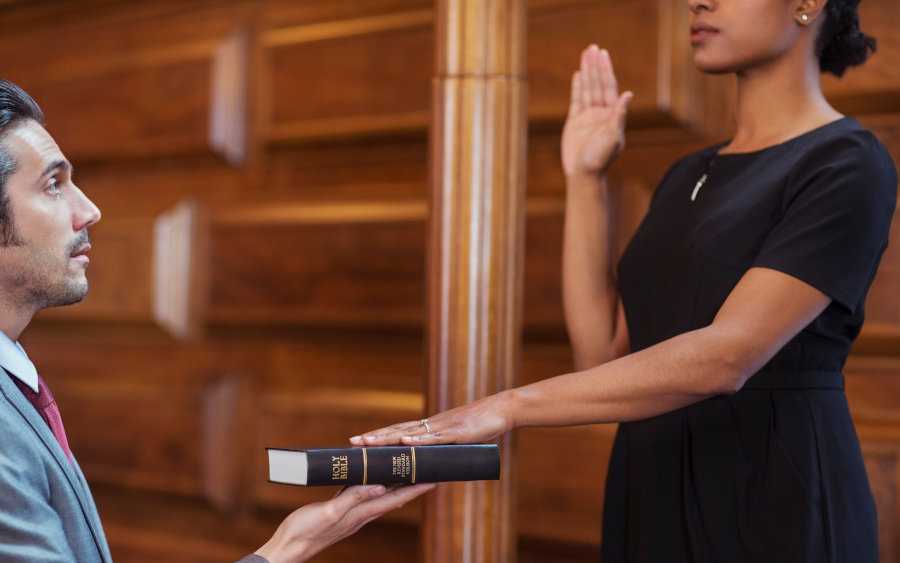
Perjury – California Penal Code 118
Perjury is a serious crime under California law and seeks to punish individuals who lie while their honesty is being relied upon in official matters. If you are facing charges for perjury, here is what you need to know about the elements of the crime, the possible penalties, and the possible defenses you may be able to raise.
Elements of Perjury
There are several elements of perjury, which requires certain underlying conditions, including when and where certain statements are made. The elements of perjury in California are:
- The defendant took an oath to testify, declare, depose, or certify something as true
- The defendant was in court or another competent tribunal or officer
- The defendant willfully lies and violates the oath he or she took
- The content of what the defendant lied about was material1
So, according to California’s law, a person must know that he or she is saying something false at the time of making the statement and be making a statement that is subject to the possibility of penalties for committing perjury or in other recognized instances under the law.
Additionally, the law requires that the defendant’s false statements be established by direct or indirect evidence and that it is not enough to simply have another person contradict the defendant’s account.2
Examples of Perjury
There may be several different types of acts that can result in charges of perjury including:
- Intentionally lying in court
- Providing false statements at a legal deposition
- Providing false information on a legal document that contains a warning about making statements under penalty of perjury
- Lying on an official government form, such as an application for a driver’s license or for public benefits
- Making a materially false statement in a police report if you are a peace officer
Consequences for Committing Perjury
If you are charged with perjury in California, you can face a felony charge and up to four years in jail and a maximum fine of $10,000.3 The judge has the discretion to order probation instead of a jail term.
A peace officer who commits the crime can be charged with a misdemeanor or a felony and can be imprisoned in a state prison for one, two, or three years for the felony charge.4
Possible Defenses to Perjury
There may be several possible defenses to perjury, including the following:
Lack of a Necessary Element
As explained above, perjury charges require the prosecutor show that certain elements existed in the case. If one of these necessary elements is lacking, there should be no conviction. The most common attacks on the elements, including:
- The defendant did not intentionally lie – Even if the defendant provided inaccurate information, the prosecutor has the burden of showing the defendant lied. If the defendant did not know the information was not true but did not intend to make a false statement, this is not the same as lying.
- Not under oath – Perjury can only be charged when the defendant makes a statement at a certain time or in certain situations. For example, he or she may be testifying at a criminal or civil court proceeding. Or, he or she may be signing a document that states he or she is making the statement under the penalty of perjury. If perjury rules do not apply, there may not be an actionable case.
- The statement is not material – If the statement was not one of consequence and was immaterial, this can be a defense even if the statement was false.
Coercion
A coercion defense may apply if you were forced to lie against your will, such as if someone threatened your life or your loved one’s life if you did not make the statement.
Recantation
It may be a defense if you tried to recant the false statement in a timely manner so even though you made the false statement, you tried to make it right by correcting your testimony.
References
1 California Penal Code 118(a) – “Every person who, having taken an oath that he or she will testify, declare, depose, or certify truly before any competent tribunal, officer, or person, in any of the cases in which the oath may by law of the State of California be administered, willfully and contrary to the oath, states as true any material matter which he or she knows to be false, and every person who testifies, declares, deposes, or certifies under penalty of perjury in any of the cases in which the testimony, declarations, depositions, or certification is permitted by law of the State of California under penalty of perjury and willfully states as true any material matter which he or she knows to be false, is guilty of perjury. This subdivision is applicable whether the statement, or the testimony, declaration, deposition, or certification is made or subscribed within or without the State of California.”
2 California Penal Code 118(b) – “No person shall be convicted of perjury where proof of falsity rests solely upon contradiction by testimony of a single person other than the defendant. Proof of falsity may be established by direct or indirect evidence.”
3 See California Penal Code 1170.
4 California Penal Code 118.1 – “Every peace officer who files any report with the agency which employs him or her regarding the commission of any crime or any investigation of any crime, if he or she knowingly and intentionally makes any statement regarding any material matter in the report which the officer knows to be false, whether or not the statement is certified or otherwise expressly reported as true, is guilty of filing a false report punishable by imprisonment in the county jail for up to one year, or in the state prison for one, two, or three years. This section shall not apply to the contents of any statement which the peace officer attributes in the report to any other person.”
